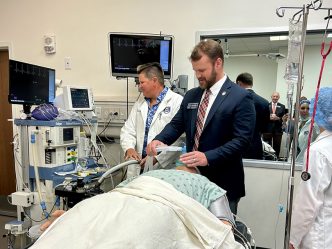More and more it appears the key to unlocking victory against breast cancer may lie within the body of each patient. Chemotherapy, radiation and surgery may be the first line in the standard of care now, but a visiting clinician and researcher from Johns Hopkins School of Medicine told a group of Medical College of Georgia students that new immunotherapy options maybe available by the time they graduate.
“We are beginning to hear more about medications called immune checkpoint inhibitors that trigger the immune system to attack tumors,” said Dr. Vered Stearns, Professor, Breast Cancer Research Chair and Co-Director of the Breast and Ovarian Cancer Program for the Sidney Kimmel Comprehensive Cancer Center at Johns Hopkins. “We have seen immunotherapies for melanoma and lung cancer work well. Now, we’re seeing promising data for patients with triple negative breast cancer.”
Stearns was the honorary speaker at the Department of Medicine grand rounds for the Georgia Cancer Center and Medical College of Georgia in October, which is Breast Cancer Awareness Month. She has a passion for treating her current patients and researching the best approaches for those diagnosed with breast cancer in the future, and she shared her vision and current advances in metastatic breast cancer with a large group of audience through her well received talk. Currently, her research looks at biomarkers found in tissues and blood to see how patients will respond to chemotherapy and when the therapy will cease to keep the cancer in check.
“We know that treatments reducing the amount of estrogen in the tumor cells can be effective at either preventing cancer from growing or suppressing it for a period of time,” Stearns said. “But, in metastatic breast cancer, eventually the cancers become resistant and start growing despite the treatments.”
According to Stearns, some women taking hormone therapies that target the estrogen receptors in tumor cells found in breast tissue can stop working if the receptor undergoes a mutation. This mutation, called ESR-1, can nullify the effects of the hormone therapy. But through her research, Stearns is developing the ability to identify those mutated receptors.
“One day I would love to have the ability to predict when the treatment is going to stop working,” she said. “If we can identify treatments that will work even if you have this mutation, then we can likely help people live longer.”
Right now, oncologists use imaging tests such as positron emission tomography, or PET scans, every two to three months to see if there are signs of the cancer returning. While two or three months may not seem like a long time, it can feel like an eternity for a patient worried about a relapse. But Stearns’ goal is to create a blood test or an imaging test that cuts out the wait time by showing when the treatment will stop working.
 Augusta University
Augusta University




